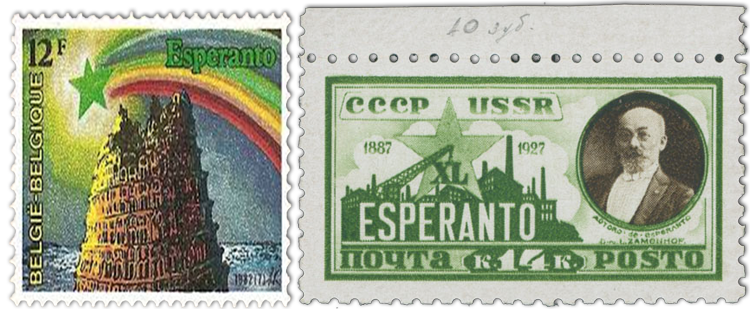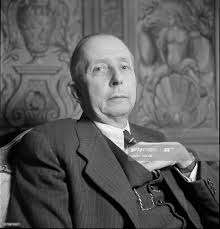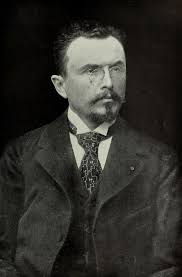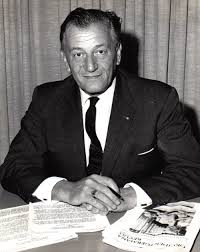Esperanto’s New Optimism
by Norman Berdichevsky (April 2021)

Supporters of Esperanto have had to contend with the accumulated prejudices of a host of adversaries over four generations (see here and here). Since the first textbook of Esperanto was published in 1887, supporters have lived through recurrent periods of intolerance, active persecution and mass repression from an amazing variety of enemies who took it seriously from the very beginning. Only the uninformed, or ignorant are naive enough to ask, “Can there be anyone in the world more harmless than an Esperanto enthusiast?” However, no matter how many times it can be documented that its author, Dr. L. L. Zamenhof never intended an “international auxiliary language” to solve any of the world’s problems, but only help people communicate and reduce the inconvenience of the language barrier, Esperanto is still often regarded as the trivial plaything of eccentrics, “cranks” and “misguided idealists.”
Critics and trivializers of Esperanto would no doubt have a different opinion today if they were able to read the 530 page work La Dangera Lingvo – Studo Pri la Persekutoj Kontra Esperanto by Ulrich Lins (1988, Bleicher Publishing, Amsterdam). Yet Lins’ book was initially translated from Esperanto into and German, Italian, Russian, Lithuanian and Korean and only finally appeared in English in 2016 (The Dangerous Language, Study on the Persecutions Against Esperanto), Macmillan, translated by Henry Tonkin).
The Many Opponents
This lack of interest was no surprise, given the rather scant attraction towards Esperanto in English speaking countries. In a national American bestseller book, Cultural Literacy; What Every American Needs to Know (Houghton Mifflin, 1988), while explaining 5,000 essential concepts, author E.D. Hirsch, Jr. did not mention Esperanto at all. As late as 1947, when the World Esperanto Congress was held in London, the BBC gave it practically no coverage and refused to publish any expressions of support from local or touring Esperantists in the U.K. seeking to validate and confirm positive experiences with the language. Times have sinced changed and recent interviews and reports about the robust health and renewed popularity of Esperanto have characterized recent BBC online references such as “The invented language that found a second life online.”
Many Brits and Americans are therefore usually surprised to learn that 19 nations have seen fit to honor the language and its founder, Dr. L. L. Zamenhof, by issuing postage stamps in their honor. These countries also have installed hundreds of similar commemorative plaques and statues and dozens of streets. See the Belgian stamp commemorating Esperanto and its eventual triumph over the Tower of Babel, below left, and a 1927 Soviet postage stamp with Zamenhof’s portrait.

From the earliest days of Esperanto, governments and ultra-nationalists were quick to see potential dangers to their authority in the message spread by Esperanto. These range from the totalitarian regimes of Hitler and Stalin, Italy during the latter period of Mussolini’s rule, the Japanese government of the late 1930s and World War II, all the “People’s Democracies” in Eastern Europe from 1948 to 1955 and including psychopaths heading isolationist states such as Enhver Hoxha in Albania, and Romania’s Nicola Ceausescu who made learning any foreign language the equivalent of disloyalty. Spanish General Franco’s hostility from 1939 to 1955 was motivated due to Esperanto’s popularity among left leaning Catalan nationalists and refugees as a temporary mask for their activities.
As early as February 1895, when the language was still in its infancy and had its base in the Russian Empire, the magazine La Esperantisto was blocked by the censor because it included an article by Leo Tolstoy, an enthusiastic supporter of Esperanto and unwelcome by Czarist officials. In Nazi Germany, the authorities immediately understood that the internationalism, pacifism and equality which went hand in hand with Esperanto were the exact opposite of everything proclaimed by the Nazi ideal of a superior “Aryan” race destined to rule over the lower beings, the “Untermenschen.” Added to this, in Mein Kampf (1925, Vol.1, Chap.XI), Hitler expressed his belief that Esperanto would be used by the Jews to achieve world domination. When the Jews were deported from Warsaw, the Gestapo received specific orders from Berlin to search for the descendants of Zamenhof (the creator of Esperanto). All three of his children died in the concentration camps.
In Imperial Japan, too, the police force immediately recognized the progressive (and potentially communist) tendencies of the Esperanto movement. In the first decade of the 20th century the police began to take an interest in the relationship between anarchists and Esperantists and, in 1934, the Japanese Proletarian Esperantist Union was shut down. It is harder to understand the reasoning behind the persecution of Esperanto speakers in the USSR under Stalin. Immediately after the Russian Revolution there was a flowering of languages in the new Soviet Union. New alphabets were created, all minority languages were recognized, and there was official support and subsidies of Esperanto, even its use promoted in a Jewish kolkhoz in the Ukraine (“Nova Vivo”) established by Communists who had abandoned Zionism and left Palestine. In fact, enthusiastic reports in the early Soviet press maintained that the language was a huge ally for Marxist theory which predicated that the interests of the working class worldwide should always take precedence over national, linguistic and religious differences.
Missed Opportunities
However, in the 1930s under Stalin, Soviet society underwent a period of closing in on itself and suspecting everything which potentially had links with other countries. Esperantists were people who freely corresponded with foreigners, or at least were in a position to do so. Esperantists who were also communists and who grasped how Stalin had betrayed the revolution, were the most aware of the reality of life in the USSR and would be able to reveal it in many international forums without the language barrier. Stalin was alarmed to learn that more than 120 Esperanto clubs and study groups were operating throughout the county and that the postal authorities had determined that a considerable segment of mail arriving from abroad was in Esperanto. This only testified to the success Esperanto had achieved in the USSR. Consequently, from 1937, THE NKVD added Esperantists as prime candidates for the gulags where thousands perished. The principal matter that inflamed Hitler and Stalin or the other megalomaniac dictators was simply Zamenhof’s Jewish and humanist sentiments and his total lack of nationalist and class-based loyalties.
One feature of Hebrew that Zamenhof undoubtedly copied was the use of an invariable suffix to denote the female noun form among words representing personal nouns for people and animals so that father-mother uncle-aunt, brother-sister or even words for occupations could distinguished by gender could easily be remembered. This feature also immediately provides additional information lacking in languages such as English for example. In Esperanto, a male doctor is kuracisto, a female one is kuracistino; a male lawyer is an advokato, a female one advokatino. The reader or listener does not know the gender of a doctor or lawyer or teacher in English. In current English usage the trend has been to entirely eliminate such gender distinctions so that actress, heroine, waitress and many others are now considered politically incorrect and antagonize the political Left as offensive. Stung by this aspect of Esperanto grammar, a new host of enemies among academic philologists and the upper classes sprung at it as a fiendish Frankenstein-like monster, bent on eliminating Classical Western civilization derived from Latin and antiquity.
 These academics, most notably in Catholic France, Belgium and Romandy (French-speaking Switzerland), were upset that an “amateur” (a medical doctor with no degree in linguistics) could “invent a language.” They were revolted by a word like patrino (mother in spite of the patronymic Patr– initial form of the word) and declared Esperanto was a barbaric invention, a “jargon without a soul.” These ridiculous charges were thrown at Zamenhof for using such paired words like patro-patrino and frato-fratino (brother and sister), onklo-onklino (uncle and aunt). For many Christian ultra-conservative Catholics such as Gonzague de Reynold, right, the patrician Franco-Swiss academic, this was the work of a heretic that violated all the “holy traditions and canons of classical Western civilization.” He referred to Esperanto as “barbaric” and “Slavic” and objected not only to its “artificial” nature and like Hitler, despised the Jewish and “liberal” humanist sentiments free of any class distinction, and the aspiration to educate the working class by eliminating the language barrier. For the record, this criticism was nonsense and several thousand children raised as native Esperanto speakers have used the word “patrino” in the same affectionate way with its maternal and feminine attributes as Europeans use in their national languages in which mother is represented by words deriving from the root MTHR.
These academics, most notably in Catholic France, Belgium and Romandy (French-speaking Switzerland), were upset that an “amateur” (a medical doctor with no degree in linguistics) could “invent a language.” They were revolted by a word like patrino (mother in spite of the patronymic Patr– initial form of the word) and declared Esperanto was a barbaric invention, a “jargon without a soul.” These ridiculous charges were thrown at Zamenhof for using such paired words like patro-patrino and frato-fratino (brother and sister), onklo-onklino (uncle and aunt). For many Christian ultra-conservative Catholics such as Gonzague de Reynold, right, the patrician Franco-Swiss academic, this was the work of a heretic that violated all the “holy traditions and canons of classical Western civilization.” He referred to Esperanto as “barbaric” and “Slavic” and objected not only to its “artificial” nature and like Hitler, despised the Jewish and “liberal” humanist sentiments free of any class distinction, and the aspiration to educate the working class by eliminating the language barrier. For the record, this criticism was nonsense and several thousand children raised as native Esperanto speakers have used the word “patrino” in the same affectionate way with its maternal and feminine attributes as Europeans use in their national languages in which mother is represented by words deriving from the root MTHR.
An arch reactionary, de Reynold even urged the dissolution of Switzerland in order to merge with Nazi Germany following the German annexation of Austria.
A member of the nobility, de Reynold was Professor of History and Literature at the Universities of Fribourg and Berne who venerated Latin, and believed that Esperanto was “one more sign of the decadence” and corruption of European society since the French revolution. He studied at Collège Saint-Michel, the Sorbonne, and the Institut Catholique de Paris before returning to Switzerland to teach philosophy and French literature. Deeply skeptical of liberal social-democratic forms of government and vigorously opposed to modernity, de Reynold devoted his life to the promotion of traditionalist Catholic causes. His lifelong misgivings about Esperanto and its Jewish-secular associations have long been made anachronistic. In 1977, Vatican Radio began regular broadcasts in Esperanto (three times a week since 1998, usually on Sundays, Wednesdays and Thursdays for at least 10 minutes each session). In 1990, the Congregation for Divine Worship and the Discipline of the Sacraments approved the Esperanto translation of the prayers of the Mass. The Esperanto Missal and Lectionary for Sundays and Feast days was published in 1995. In 1994, Pope John Paul II began to include Esperanto among the languages of his annual Easter and Christmas greetings; at Easter 2006, Pope Benedict XVI continued this tradition of his predecessor. All Popes following Pius XII have welcomed and supported the Esperanto movement.
 In de Reynold’s view, Swiss, Catholic, and European identities were inextricably linked, and he devoted two decades of his career to international affairs in service of this belief. As the Swiss delegate to the League of Nations from its inception in 1922 to its demise in 1939, he actively mobilized against any recognition of Esperanto in League affairs. He found an eager ally in the leader of the French delegation, Gabriel Hanotaux, right, a French diplomat who actively opposed any resolution or even research on the issue of an alternative to the two official League languages. Hanotaux held the portfolio of Minister of Foreign Affairs from 1896 to 1898 and developed the rapprochement of France with ultra-conservative Czarist Russia. He was an active delegate to The League of Nations during the early 1920s and worked closely in coordination with de Reynold. He was elected a member of the Académie francaise in 1897 and participated in several debates regarding League policy.
In de Reynold’s view, Swiss, Catholic, and European identities were inextricably linked, and he devoted two decades of his career to international affairs in service of this belief. As the Swiss delegate to the League of Nations from its inception in 1922 to its demise in 1939, he actively mobilized against any recognition of Esperanto in League affairs. He found an eager ally in the leader of the French delegation, Gabriel Hanotaux, right, a French diplomat who actively opposed any resolution or even research on the issue of an alternative to the two official League languages. Hanotaux held the portfolio of Minister of Foreign Affairs from 1896 to 1898 and developed the rapprochement of France with ultra-conservative Czarist Russia. He was an active delegate to The League of Nations during the early 1920s and worked closely in coordination with de Reynold. He was elected a member of the Académie francaise in 1897 and participated in several debates regarding League policy.
In favor of Esperanto’s cause at the League was Nitobe Inazo, a Japanese agricultural economist and Quaker, who attended the 13th World Congress of Esperanto in Prague and returned convinced of its advantages. An initial League resolution praised Esperanto but two subsequent ones that encouraged its use were vetoed by France. The French, using pressure on small states, forcing a final vote of all the member states of the League which they won 26-12 to refer all issues of language cooperation to a “Committee on Higher Education” to endorse the “increased study of the major national languages.”
Ten delegates representing “minor states” Belgium, Brazil, Czechoslovakia, Chile, China, India, Haiti, Italy, Persia, Colombia, and South Africa accepted the initial the pro-Esperanto proposals. This is quite remarkable, given the often-voiced criticism of Esperanto that it would not appeal to the non-European peoples with vastly different languages. This criticism of Esperanto as “too European” was false and is just as wrong today. China, South Korea and Japan continue to be among the countries with the most active support of Esperanto. In 1912, following the successful revolt of republican forces against the emperor, the Minister of Education, Cai Yuan-pei proposed the introduction of Esperanto into the curriculum but chaotic conditions and civil war prevented any practical steps.
Further Missed Opportunities; The Failures of the League of Nations
Two years after winning the Nobel Prize in Physics in 1921, Albert Einstein felt compelled to voice his disapproval of the League for bowing to French interests, especially as a result of the debate on Esperanto and even worse, French occupation of the Ruhr to further punish Germany for lagging behind payment of reparations. Einstein had been attacked by German nationalists for sitting out the war due to his acquisition of Swiss nationality, and refusal, along with two other German dignitaries among 96 to sign a declaration of support for German national interests at the outbreak of the war.
He decided to accept the title of “Honorary President” of the Third Congress held in 1923 by a fringe Esperanto Organization S.A.T. (Sennacieca Asocio Tutmonda
Two prominent British professors with outstanding international reputations later became involved in the dispute over criteria for the most useful international “auxiliary language” to facilitate worldwide communication, especially following the purchase in 1946 for the sum of £23,000 by the British government of the copyright to BASIC ENGLISH. The first was Professor C. K. Ogden of Cambridge University, chief architect of the scheme to simplify English and make it the accepted international auxiliary language. Writing in the periodical “The British Esperantist” in 1932, Oxford Professor J.R.R. Tolkien noted that philologists such as Ogden who opposed Esperanto were biased and shortsighted. Ogden had written a 30-page document criticizing Esperanto as a “fifth wheel,” and therefore wholly unnecessary. Tolkien mocked Ogden’s narrow “scholarly” views on word derivations that only made such classical philologists with their compulsive-obsessive regard for the origin of words, “nuisances.” In fact, Tolkien endorsed Esperanto and referred to it as “taken all round, superior to all present competitors, but its chief claim to support rested on the fact that it had won the widest measure of practical acceptance.” New Optimism: Unesco Resolution and the End of Stalinism The Twentieth Party Congress of the Soviet Communist Party exposed Stalin’s “Cult of the Personality” and monstrous crimes—among whose victims were thousands of dedicated Esperantists. This lead to a removal of all prohibitions against the teaching and propagation of the language both in the USSR and all the satellite states of Eastern Europe. It has further been aided by the remarkable advances in computer technology for language learning such as Duolingo. These developments provided the chance for the movement to recover its security and rebuild its ranks. Many Esperantists, known as Raumists (after a 1980 congress held in Raum, Finland) no longer seek “La Fina Venko” (The Final Victory). They are content to delight in being part of “a stateless diasporic linguistic minority” based on freedom of association, and their love of the language as speakers, readers, writers and poets. ______________________ Norman Berdichevsky is a Contributing Editor to New English Review and is the author of The Left is Seldom Right and Modern Hebrew: The Past and Future of a Revitalized Language. Follow NER on Twitter @NERIconoclast  By 1954, the Esperanto movement had sufficiently recovered from the grievous setbacks of the 1930s and World War II to launch a major campaign led by the President of the Universal Esperanto Association (UEA), Ivo Lapenna, right, gathering more than a million signatures on a petition to convince Unesco to adopt a resolution encouraging the use of Esperanto. Its final paragraphs state that Unesco takes note of the results attained by Esperanto in the field of international intellectual relations and the rapprochement of the peoples of the world; recognizes that these results correspond with the aims and ideals of Unesco and authorizes the Director-General to follow current developments in the use of Esperanto in education, science and culture, and, to this end, to co-operate with the Universal Esperanto Association in matters concerning both organizations.
By 1954, the Esperanto movement had sufficiently recovered from the grievous setbacks of the 1930s and World War II to launch a major campaign led by the President of the Universal Esperanto Association (UEA), Ivo Lapenna, right, gathering more than a million signatures on a petition to convince Unesco to adopt a resolution encouraging the use of Esperanto. Its final paragraphs state that Unesco takes note of the results attained by Esperanto in the field of international intellectual relations and the rapprochement of the peoples of the world; recognizes that these results correspond with the aims and ideals of Unesco and authorizes the Director-General to follow current developments in the use of Esperanto in education, science and culture, and, to this end, to co-operate with the Universal Esperanto Association in matters concerning both organizations.